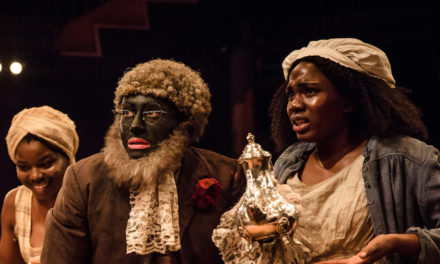There is nothing wrong with Albion. But the fact that the play is now ‘returning’ to the Almeida Theatre, following a successful run in 2017, means that it demands a different level of engagement. Rather than take the play ‘less’ seriously, we have to subject it to ‘more’ scrutiny. And I remain to be convinced that Albion can withstand such scrutiny.
This is not to say that it is a bad play (if one insists on such normative appraisals). In fact, it is rather good and boasts wonderful actors who have already demonstrated once before their mettle in their respective roles. And they have received much deserved praise for it.
While there will undoubtedly be some who will be seeing the play for the first time, as a critical undertaking there is no need to comment on the normative features of the work since it is virtually unchanged (save for the addition of Daisy Edgar-Jones and Angel Coulby). Victoria Hamilton and Helen Schlesinger, in particular, remain as good as ever. Nicholas Rowe, returning as Paul ‘the Husband’ seems almost a little too comfortable in the role although it is undeniable that he succeeds at portraying the hand-in-pockets drollness of the average ‘top-gear’ viewer.
The performances remain the play’s best feature. But it is the expectations that come with its ‘second life’ that hinders the revenant Albion in its own ambitions. The play has to endure the double weight of being resurrected as a classic before its time as well as styling itself as politically relevant. But it cannot be both timeless and timely, no matter how much it wants to be. In so doing, it risks being neither.
Much has been made of the manner in which the play alludes to Brexit. But in Albion, there is a slightly pathetic quality to the manner in which the play has to check-in with its audience that they are (wink-wink) in agreement about the political undercurrents of the work. And yet somehow the play manages to stay within a comfortable range of middle-class witticism, countryside banter, and patriotic imagery. We are dealing here mostly with types, although perhaps that is the point.
The play also takes aim at the idea of Britain as the so-called ‘blessed plot’ and renders it a literal garden. The garden, we are meant to understand, is a sort of metaphor for the UK’s nostalgia for some fictional collective homeland. The title of the play itself (Albion) is of course also a direct allusion to the romanticized Brittonic name for the Island of Great Britain. There is a mythic dimension to the name, almost literally, since it is the Hellenized/Latinized version of the Gallic root for ‘Albus’, meaning ‘White’ (think of the contemporary word ‘albino’ as an example of how this word is still retained in current speech). There is a nice pun to be determined here. The title is also an allusion to the protagonist’s professional identity. She runs a chain of boutique lifestyle home-ware stores, aptly named ‘White’.
This means that the desire to live in the country is not so much that of a ‘return’ as much as it is a signifier of social status. This is always the function the city of London has had for the country’s elites; that it functions as something which one can go through so as to ‘leave London behind’. Her country life indicates her success in London, the fact that her business still needs her there only heightens this.
The garden in question was never a ‘real’ English garden; or perhaps it was precisely a real ‘English’ garden because it was created as a memorial to the fallen soldiers of WW1. This is why it is called the ‘red garden’. “Its about blood,” our protagonist says. And indeed, it is a burial ground. Twice over, both figuratively and literally, she scatters the ashes of her son onto the soil. He too was a soldier. The garden is now a memorial site to a new war, and a new generation of soldiers, and a new generation of unacknowledged privilege. In this mélange of associate mythmaking, the play’s allegorical elements shine through all too clearly.
Still, there’s a nice moment when the daughter seems to ask the Polish cleaner (played by Edyta Budnik) what her opinion is of Brexit. The cleaner replies casually, “It’s not my problem, it’s yours”. Here the political observation is much more direct and more astute than in the heavy-handed allusions to Hungary and Fascism.
Albion puts us in a peculiar position because instead of adjusting itself to suit the times, it asks us to adjust our reading of the times to suit it. Albion wants to be both of its time, ahead of its time, and timeless. It cannot be all at once. This tension underlines the problems I have with the play, lest anyone think I find it to be a bad work, which it is patently not. And yet the play buckles under the weight of its own contradictory expectations. It wants to be both timeless and timely.
The play remains entirely deserving of praise, but its aspirations as a ‘vital’ piece of political commentary are ultimately unwarranted. As an artistic, aesthetic, ‘even ‘political’ proposition, the problem of Albion is that it presumes to do more than it can actually deliver. And this, unfortunately, is the unwanted analogy with Brexit that comes most to mind.
This post was written by the author in their personal capacity.The opinions expressed in this article are the author’s own and do not reflect the view of The Theatre Times, their staff or collaborators.
This post was written by Julian De Medeiros.
The views expressed here belong to the author and do not necessarily reflect our views and opinions.


















